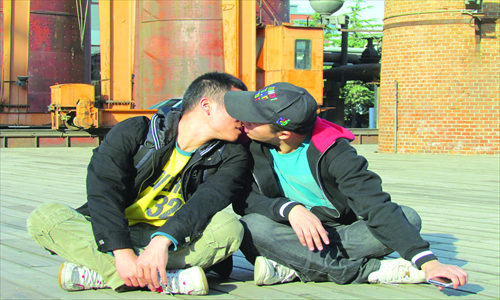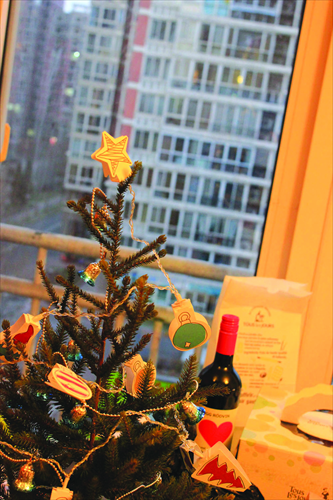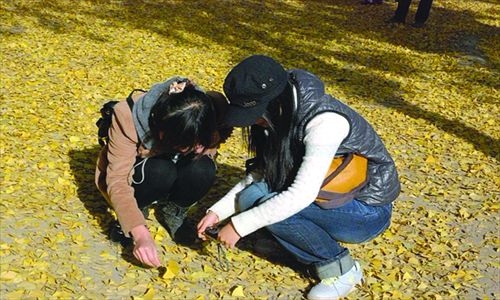Cruising for love

A growing number of people in Beijing's LGBT community are hooking up online, but many still prefer meeting face to face. Photo: Courtesy of Geng Le
Like many unmarried women her age, Da Dao (pseudonym) has had more than her share of failed romances. Each time one of her relationships gets serious, it inevitably fizzles out for one reason or another.
But Da Dao's quest to find a life companion is made all the more difficult by the ups and downs of Beijing's lesbian, gay, bisexual and transgender (LGBT) dating scene.
Da Dao, 39, is currently happy with her 34-year-old girlfriend, but fears their relationship could end in heartache due to pressure from her partner's family to marry.
"My previous relationships didn't work out because [ex-girlfriends] said they would enter heterosexual relationships or marriage. Some actually did this, but one just used it as an excuse to break up with me," said Da Dao.
Digital evolution
Social pressures to marry and discrimination against the LGBT community can make it difficult for many gay people to be open about their sexuality, let alone explore the dating scene.
Geng Le, founder of Grindr-like app Blued and director of China's largest gay information website danlan.org, said gay people seeking hookups were previously restricted to cruising for casual sex partners in parks or public toilets.
"Clandestine areas at parks in many cities are used for gay people to hook up. Cell phone numbers are scrawled on walls inside toilet stalls for gay people to get together," said Geng, a former policeman.
"The eastern and western sides of the Forbidden City and public toilets in Zhongshan Park were once famed gathering places for gay people, as depicted in East Palace, West Palace," said Geng, referring to a 1996 film about Beijing's homosexual scene.
The gradual pivot away from public hookups began when gay online chat rooms became popular in China a decade ago. This was followed by the emergence of similar groups on online chat service QQ, gay social networking websites and, more recently, smartphone dating apps.
Since its launch in November 2012, Blued has offered a more convenient, reputable way for gay men to meet. It currently boasts more than 1.5 million users and is only available in Chinese. Like heterosexual dating apps, users can refine their search for a partner based on their professional, educational and physical characteristics.

A scene from a 2011 Christmas gathering organized for lesbians. Photo: Courtesy of Lesdo

Two lesbians at a social gathering. Photo: Courtesy of Lesdo
Lesbians log on to love
April (pseudonym), a 27-year-old lesbian, recently quit her job in IT to concentrate on developing lesbian dating app Lesdo, which will be launched later this month.
"We originally planned to develop an app similar to [smartphone messaging service] WeChat exclusively for lesbians. But after surveying lesbians we found there was strong demand for dating services, yet relatively few appropriate channels," said April.
Lesdo functions much like Blued, Grindr and worldwide lesbian social app The L by finding nearby users and displaying their profile and picture. Lesdo will become the second lesbian social app available in China after The L, which has more than 100,000 users.
April began setting up channels for lesbian dating and socializing, such as groups on QQ and douban.com, during her university years. Rather than exclusively trying to connect lesbians with partners, the main aim of such groups was to foster friendships.
"I never thought that there were so many lesbians when I started. Within a month of setting up our QQ group, 200 people had joined. Each week we held activities, such as badminton, karaoke and mountain climbing, which attracted more than 50 people on average," said April.
Hooking up in person
Even though Da Dao met her current partner without the help of a dating app, she said such online resources have enlarged her circle of lesbian friends.
Gay dating and social apps have allowed the local LGBT community to grow more close-knit and consolidate a sense of belonging, Da Dao said.
"In a society where being LGBT often means being invisible and unwilling to stand out, it can be hard to tell who is gay," she said.
Despite the greater convenience and discretion offered by online dating services, Da Dao insisted that meeting in person is preferable because it is "more real."
"Sometimes when you chat to someone online you can feel a sense of chemistry, which disappears when you meet in person and discover they are nothing like their online persona," said Da Dao.
Geng said that most Blued users are aged in their 20s and either studying at university or fresh graduates. But not everybody is eager to embrace technology.
"Many gay men of older generations still prefer to cruise public places for 'fresh flesh,'" said Geng.
Materialistic desires
Ahead of November 11, observed as Singles' Day in China, April and her team conducted a survey of nearly 100 lesbians to research dating preferences. Around half of respondents said they didn't have a specific method for finding dates, while those who did nominated social networking website douban.com, QQ groups and online forums as useful platforms.
Both Geng and April said that youngsters value a person's appearance most when considering a partner, while older people prefer to consider a potential companion's education and salary.
"There are few differences between gay and straight people regarding their standards for choosing a lover," April said.
Da Dao, a native of Henan Province who has a high school education, minimal savings and doesn't own a home, said her personal situation was hard to accept for companions close to her age.
"Because most of my partners have been the only children in their family, they deal with heavy pressure that can strain a relationship," said Da Dao, who has two brothers.
Tying knots of dishonesty
After breaking up with his boyfriend of three years, 28-year-old Xin Yu (pseudonym) hinted to Metropolitan that his next partner might be a woman.
"With no legal rights or means to have children, it's hard to survive being in a long-term gay relationship. Getting married to a lesbian might be a good choice," said Xin Yu, who is yet to come out to his family.
Known in Chinese as xinghun, or a homosexual-lesbian marriage, such unions usually aim to appease families of both spouses.
Nevertheless, more than 80 percent of gay people marry heterosexual partners, according to Zhang Beichuan, a leading HIV expert at Qingdao University, who made the remarks to the Xinhua News Agency in 2005.
Xin Yu said if he marries a heterosexual woman, he would abandon his gay lifestyle.
"Social pressures make unmarried people seem abnormal in some people's eyes. If I do get married [to a heterosexual woman], I will turn my back on homosexuality forever. Sex is only an auxiliary thing in marriage, and I believe I could be a good husband," he said.
Xin Yu said in the past he had met and dated men via online chat rooms, gay social networking websites, social events and gay dating apps.
"I prefer social activities because most participants are people we are all familiar with, so it's more reliable," said Xin.
Geng said that over the past two years, xinghun marriages have become less common due to disputes over asset division and children.
"Gay people shouldn't marry heterosexual partners because it is dishonest and immoral," said Geng.
April, who has also not yet revealed her sexuality to her family, hopes to one day tell them the truth.
"By developing Lesdo, I hope I can show my parents that there are many people like me. Heterosexual marriage is not my choice," she said.